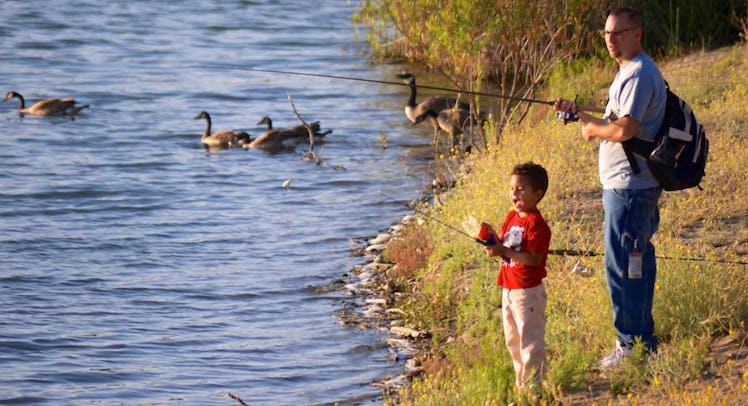No, My Son Is Not My Friend
I’m equal parts father, clown, and plaything; I sit down with the Legos, I cheer for his victories and, yes, I call him “buddy.”

“You’re not my best friend today,” is my son’s diss du jour. With his brow furrowed, skinny index finger pointing in my direction, he is earnestly trying to hurt my feelings. Sometimes, he’ll play to the room — naming, instead, his mother as current BFF. Sometimes, the dog.
I shrug and reply, “I can live with that.” Or, “That’s cool with me.” Or, “I’ve got plenty of friends already.”
My son’s vain attempt to weaponize our camaraderie must have its origins at daycare, where best-friend status carries weight. He sure as hell didn’t pick it up at home. Colloquially, my son is my buddy, pal and occasionally dude, but he’s not really my friend. And I plan to keep it that way.
My resolution stems from an article I read in 2012, a full year before my kid was born. In “More Than a Son, He’s My Buddy,” the New York Times digs into a simple observation that “buddy” is a very common nickname for one’s kids these days. The article ticks every box on the New York Times bullshit checklist, including a nonsense trend (“Buddy Parenting”) — in Brooklyn — and evidentiary quotes from a blogger:
Like a lot of parents who use the nom de bébé, Dan Pearce, 32, author of the blog Single Dad Laughing, began calling his son buddy around the time he started to walk… “If I had all my buddies lined up in a row,” Mr. Pearce was telling his son Noah, 5, when they were alone in the car last month, “and I had to choose my best buddy, it would be you.”
Good lord, I thought at the time, if this is modern fathering, I am fucked.
According to Dr. Michele Borba, Buddy Parenting is “Placing popularity with your child above establishing limits, boundaries or saying no.” It’s on her list of “Seven Toxic Modern-Day Parenting Styles,” alongside Helicopter Parenting and Accessory Parenting (bumper stickers, trophy cases).
I don’t read parenting books, but I like where Dr. Borba is coming from. I was never my father’s friend, and this is by no means a criticism of his parenting style (if such a thing even existed in the ’70s). My dad was a father — an overworked man who’d sired two daughters and two sons by the time he was 30. Born in 1939, he was part of the aptly named Silent Generation. My favorite memories with him are driving to the Jersey Shore in his ’62 Corvair and carrying the tools when he fixed things around the house.
Unlike many of my peers, I have no plan to overcompensate for my father’s distance. Quite the contrary, I’ve come to admire the quiet expectations he put upon me. Maybe he never sat down and played with my Legos, but he also never pandered to me. Praise was a rarity because, in his mind, his children were smart, capable human beings — and this was the greatest compliment he could pay to anyone.
(It’s worth noting that my siblings had radically different experiences growing up. For one, I don’t envy my eldest sister for being on the receiving end of our father’s hair-trigger temper, which mellowed slightly over the years. I would argue that this, too, was of the time — especially with parents who themselves grew from teenagers to grown-ups as they cranked out four kids.)
That’s not to say I’m detached from my son. I’m equal parts father, clown, and plaything; I sit down with the Legos, I cheer for his victories and, yes, I call him “buddy.” We can credit modern sensibilities that allowed men to break from the past’s stiffer roles; I can also credit my mother, whose affection and attention balanced my father’s chillier demeanor. (Favorite mother memories: leaning over the front seat as she drove our enormous green station wagon, grocery shopping.)
Still, my wife and I are parents who present a united front against our toddler’s tempestuous tyranny. When he gets mad, when he plays favorites, when he wags his stupid little finger and tries to hurt our feelings, we don’t take it personally. He’s not our pal. He’s a 3-year-old. It’s his job to push buttons and learn boundaries. How else will he learn what’s acceptable and what’s not, if not by trial and error?
I must admit, though, the finger-pointing gets under my skin. That’s just bad manners, even among friends. But, as with everything else, we’re working on it.
This article was originally published on